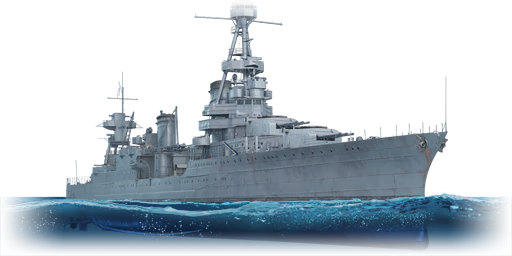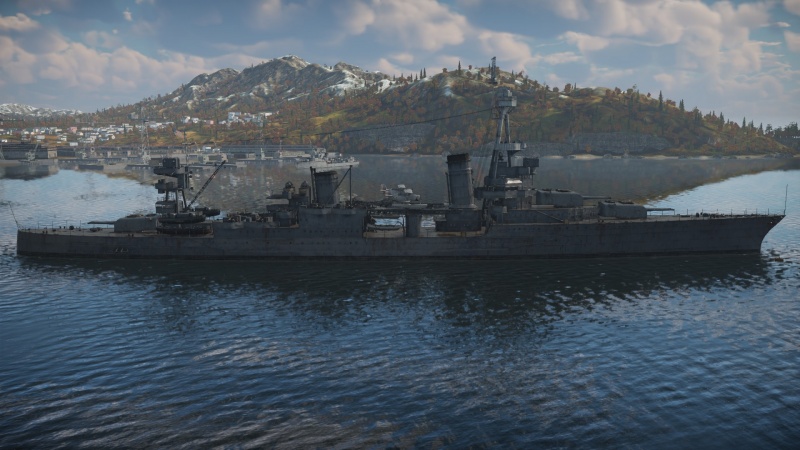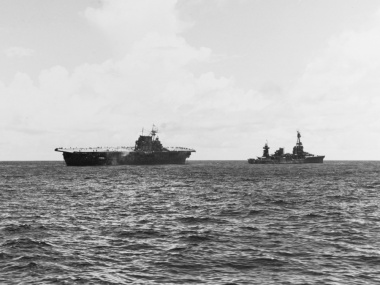USS Northampton
Contents
Description
The Northampton-class, USS Northampton (CA-26), 1941 is a rank IV American heavy cruiser with a battle rating of 5.3 (AB/RB/SB). It was introduced in Update "Raining Fire".
General info
Survivability and armour
USS Northampton's survivability is rather mediocre for an American heavy cruiser, and rather weak compared to the enemies it often faces in battle. Northampton has a main armour belt of just 3 inches (76 mm) of RHA, which can be easily penetrated by SAP and AP shells above 127 mm calibre. The magazines are protected by 95 mm of armour and sit below the waterline, meaning that they are relatively survivable. However, Northampton's ready-use shell rooms are directly below the turrets and thinly-protected, meaning that they can be detonated by enemy shells and cause severe damage. The turrets themselves only have 63mm in the front and even worse on the sides, meaning that even destroyers can penetrate and disable them. Finally, Northampton only has 872 crew members, which severely limits its effectiveness in battle.
| Armour | Front | Side | Rear | Deck/Roof |
|---|---|---|---|---|
| Turret (8"/55) | 63.5 mm 63.5 mm (gun mantlet) |
38.1 mm | 19.1 mm | 38.1 mm |
| Barbette | 38.1 mm | N/A | ||
| Magazine (Front) | 63.5 mm + 19.1mm (elevator) | 95.25 mm | 38.1 mm | 50.8 mm |
| Magazine (Rear) | 50.8 mm | 95.25 mm | 38.1 mm | 50.8 mm |
| Citadel | 38.1 mm | 31.75 mm (upper) 76.2 mm (lower) |
38.1 mm | 25.4 mm |
| Bridge | 31.8 mm | |||
Mobility
Northampton has decidedly average mobility for a cruiser, with a top speed of 60 km/h in Realistic battles and 70 km/h in Arcade - this is on par with most cruisers of other navies. The ship's turning circle and acceleration are nothing special, either.
| Mobility Characteristics | |||
|---|---|---|---|
| Game Mode | Upgrade Status | Maximum Speed (km/h) | |
| Forward | Reverse | ||
| AB | |||
| Upgraded | 70 | 21 | |
| RB/SB | |||
| Upgraded | 60 | 18 | |
Modifications and economy
Armament
Primary armament
Northampton carries a main armament of nine 8"/55 Mk.9 guns in three triple mounts, two fore and one aft. These guns are the standard armament for American heavy cruisers, and pack an impressive punch. The guns have good ballistics, and can access four shell types: Mk.14 Common, Mk.19 APCBC, Mk.25 HC and Mk.17 SP Common. Of these shells, the Mk.17 Special Common shell is most effective against cruisers, as it has a great explosive mass and enough penetration for most cruiser main armour belts. The Mk.19 APCBC shell can be used against heavily-armoured targets, but has a relatively small explosive mass of 1.65 kg. Finally, the HC shell, with almost 10 kg of explosive filler, is highly effective against destroyers and unarmoured vessels.
However, the guns have two main drawbacks. Firstly, they have the slowest reload speed of any 8-inch gun, with a fire rate of just three rounds per minute (20-second gun reload). This means that they fire much slower than their contemporaries, which typically have a fire rate of five rounds per minute (12-second reload). As well, the guns have the slowest horizontal turret rotation speed of any heavy cruiser, at just 3.1 degrees/second (comparatively, the Admiral Hipper's guns rotate at 6.8 degrees/second).
| Penetration statistics | |||||||
|---|---|---|---|---|---|---|---|
| Ammunition | Type of warhead |
Penetration @ 0° Angle of Attack (mm) | |||||
| 1,000 m | 2,500 m | 5,000 m | 7,500 m | 10,000 m | 15,000 m | ||
| Mk.14 Common | Common | 116 | 102 | 83 | 69 | 57 | 43 |
| Mk.19 APCBC | APCBC | 383 | 339 | 277 | 228 | 190 | 143 |
| Mk.25 HC | HE | 61 | 61 | 61 | 61 | 61 | 61 |
| Mk.17 SP Common | SP Common | 137 | 121 | 99 | 81 | 68 | 51 |
| Shell details | |||||||||
|---|---|---|---|---|---|---|---|---|---|
| Ammunition | Type of warhead |
Velocity (m/s) |
Projectile mass (kg) |
Fuse delay (s) |
Fuse sensitivity (mm) |
Explosive mass (TNT equivalent) (kg) |
Ricochet | ||
| 0% | 50% | 100% | |||||||
| Mk.14 Common | Common | 853 | 117.9 | 0.035 | 9 | 4.84 | 47° | 60° | 65° |
| Mk.19 APCBC | APCBC | 853 | 117.9 | 0.035 | 9 | 1.62 | 48° | 63° | 71° |
| Mk.25 HC | HE | 853 | 117.9 | 0 | 0.1 | 9.5 | 79° | 80° | 81° |
| Mk.17 SP Common | SP Common | 853 | 117.9 | 0.035 | 9 | 4.61 | 48° | 63° | 71° |
Secondary armament
Northampton carries a secondary armament of eight 5"/25 Mk.13 anti-aircraft guns, mounted on single open-mounts. These cannons are very effective medium-to-long range anti-aircraft guns, but are not effective against any armoured targets. They have access to just two shell types - Mk.36 AAC (HE-TF) and Mk.28 AAC (HE-VT). The former is a time-fuse shell (meaning that the fuse is set before the weapon is fired), while the latter is a proximity fuse shell that explodes automatically upon reaching the target. Both shells are ineffective against armoured targets, having ~35 mm of penetration. However, they are both capable of dealing with air and unarmoured targets quite effectively. The HE-VT shell is typically the better pick, as it offers greatly-improved efficiency against air targets.
The guns themselves are relatively good at short-range defence, being capable of firing at 20 rounds per minute (3-second reload). As well, they have very good vertical and horizontal firing angles. However, take note that the guns fire at a low muzzle velocity of 657 m/s which should be accounted for when manually aiming.
| Penetration statistics | |||||||
|---|---|---|---|---|---|---|---|
| Ammunition | Type of warhead |
Penetration @ 0° Angle of Attack (mm) | |||||
| 1,000 m | 2,500 m | 5,000 m | 7,500 m | 10,000 m | 15,000 m | ||
| Mk.36 AAC | HE-TF | 35 | 35 | 35 | 35 | 35 | 35 |
| Mk.28 AAC-VT | HE-VT | 36 | 36 | 36 | 36 | 36 | 36 |
| Shell details | |||||||||
|---|---|---|---|---|---|---|---|---|---|
| Ammunition | Type of warhead |
Velocity (m/s) |
Projectile mass (kg) |
Fuse delay (m) |
Fuse sensitivity (mm) |
Explosive mass (TNT equivalent) (kg) |
Ricochet | ||
| 0% | 50% | 100% | |||||||
| Mk.36 AAC | HE-TF | 657 | 24.42 | 0 | 0.1 | 3.16 | 79° | 80° | 81° |
| Proximity-fused shell details | |||||||||||
|---|---|---|---|---|---|---|---|---|---|---|---|
| Ammunition | Type of warhead |
Velocity (m/s) |
Projectile mass (kg) |
Fuse delay (m) |
Fuse sensitivity (mm) |
Arming distance (m) |
Trigger radius (m) |
Explosive mass (TNT equivalent) (kg) |
Ricochet | ||
| 0% | 50% | 100% | |||||||||
| Mk.28 AAC-VT | HE-VT | 657 | 23.45 | 0 | 0.1 | 457 | 23 | 3.25 | 79° | 80° | 81° |
Anti-aircraft armament
Northampton carries four quadruple 1.1 inch "Chicago Pianos". The 1.1 inch/75 Mk.1 gun, otherwise known as the "Chicago Piano" (because it was the size of a baby grand-piano), was the standard anti-aircraft armament for most American ships prior to the introduction of the 40 mm Bofors cannon. These guns are mediocre at best; though they have a good fire rate (similar to the AN-M2 Browning), they aren't too effective at dealing damage, and also jam rather quickly. As well, take note that the gun doesn't have ammunition options.
Northampton also carries eight single 12.7 mm AN-M2 machine guns. The AN-M2 is a navalised anti-aircraft version of the popular Browning machine gun. This gun is rather ineffective at dealing significant damage to enemy aircraft, and is only effective within ~1.5-2 kilometres at most. As well, keep in mind that these guns have a long 12-second reload after the gun's magazine has been used.
Scout plane
Located amidships are two catapults with one SOC-1 scout plane each which provide unique offensive and defensive abilities, expanding tactical options. Ship-launched scout planes fly just like regular tree units but lack munition choices and cockpit views. Alongside the typical abilities of strafing, dropping 2 x 100 lb bombs, and capping zones, the SOC-1 and other scout planes have the added ability to lay down smoke cover (up to 3 times). Captains will be wise to remember to utilise the aircraft and consider when best to use it, for example to cap a point early or late in the match, to create a smoke screen to stymie enemy bombardment and repair, to attack enemy units directly, or perhaps something completely new! With two scout planes one can risk a cap attempt at the beginning of the match, saving the second for any opportunity that presents itself.
Usage in battles
USS Northampton isn't the easiest ship to play, especially given that it faces battleships often (which completely outclass it in every aspect except anti-aircraft protection) and many cruisers too (such as USS Brooklyn and USS Helena) which outclass it in terms of firepower. As such, the ship needs to be played carefully in order to succeed in battle.
Firstly, Northampton's main battery is quite mediocre. The nine 203 mm guns, placed in triple turrets (the same arrangement as the USS Portland), have an extremely weak reload speed of 17.1 seconds with a completely spaded crew, and 20+ seconds with a stock crew. This reload speed is not competitive against most other cruisers at the Northampton's BR, and severely limits the ship's damage potential. Furthermore, Northampton's guns are inaccurate - and that is, very inaccurate. These weapons have a lot of trouble hitting things reliably beyond ranges of 8 km, making the ship hard to play at longer ranges. These constraints mean that Northampton does a lot better at closer ranges, where its main battery can hit targets reliably.
Secondly, Northampton is not that survivable. Though it does have a relatively large crew size for a heavy cruiser, Northampton lacks heavy armour, especially on its citadel, which houses the massive engine block - this trait is shared by other American pre-war heavy cruisers including USS Pensacola and USS Portland. The ship also has little protection on its first stage shell rooms (38 mm of RHA), which can be detonated by stray shells. Because of these constraints, you should try to use ground cover as much as possible to preserve survivability. In maps such as South Kvarken, with plenty of island covers, stay behind islands wherever possible. In open maps such as the conquest maps, your only hope will be to stay behind the front lines, and hope that enemies don't target you.
Finally, note that Northampton does not have great anti-aircraft defence. As the next class of American heavy cruiser after the USS Pensacola, Northampton gets sixteen 28 mm "Chicago Piano" guns in four quadruple mounts as well as eight 12.7 mm AN-M2 Browning HMGs. These weapons lack range and power, limiting their effectiveness to ranges of less than 2.5 kilometres. Indeed, the ship does carry eight 127 mm Mk 25 guns, capable of firing AA-VT (proximity fuse) ammunition, but these weapons are not capable of firing fast enough to be able to destroy faster incoming aircraft. Because of this, you should try to stay with allied ships, particularly ships with great anti-aircraft protection. This will help ensure that your ship will stay safe from enemy aircraft.
Pros and cons
Pros:
- Hard-hitting broadside of nine 203 mm (8 inch) guns in triple turrets
- Guns fire powerful ammunition at relatively high muzzle velocities
- Guns have great firing angles with one superfiring pair and one lone turret at the rear
- Better anti-aircraft armament than its historical predecessor, USS Pensacola
- Two scout seaplanes.
Cons:
- Main gun effectiveness is heavily diminished by an extremely slow reload speed (20+ seconds) and poor accuracy
- Anti-aircraft defence is still terrible and fails to hit targets reliably at longer ranges
- Not very survivable, with weak armour protection and just 621 crew members
- No access to auxiliary armaments such as torpedoes
History
The USS Northampton (CA-26) was the lead ship of the Northampton-class of heavy cruisers. Originally classified as a light cruiser due to her small size, she was later reclassified as a heavy cruiser because of her 8-inch armament. She served in the Pacific prior to the Second World War, and was escorting the USS Enterprise when the Japanese fleet attacked Pearl Harbour. She later served in the Guadalcanal campaign, participating in the Battle of Santa Cruz. However, she was sunk at the Battle of Tassafaronga, having been struck by Japanese torpedoes.[1][2]
Design and construction
The USS Northampton was the lead ship of the Northampton-class, the second American 'Treaty' heavy cruiser class following the Pensacola-class. Due to the limitations of the Washington naval treaty, they were very light at just 9,000 tons standard - even lighter than their predecessors, the Pensacolas.[1] The armament scheme was revised to feature nine 8-inch (203 mm) guns in three triple turrets, which would be featured on every subsequent American heavy cruiser.[1] Their anti-aircraft armament was initially sparse but would be refitted later on. As with all American heavy cruiser designs, they did not carry any torpedo armament. The Northampton-class were capable of making 32.7 knots (60 km/h).[1]
The USS Northampton was laid down on April 12th of 1928, and launched on September 5th 1929. She was sponsored by Grace Coolidge, former first lady of the United states. After construction was completed, she was formally commissioned on May 17th 1930.[1]
Service history
After her commissioning, the Northampton embarked on a shakedown cruise into the Mediterranean as part of the US Atlantic Fleet. Following the London Naval Treaty, the ship was reclassified as CA-26. In 1932, she moved to the Pacific fleet and was homeported at San Pedro; she would remain there until the start of the Second World War.[2]
When the Japanese attacked Pearl Harbour, the Northampton was out at sea escorting the USS Enterprise with Admiral William 'Bull' Halsey on board. She subsequently escorted the aircraft carrier Hornet on the Doolittle raid and the carrier Enterprise during the Battle of Midway.[2] She escorted the Hornet during the Battle of Santa Cruz Islands, and attempted to keep her afloat after the carrier was severely damaged by Japanese aircraft. Her attempts were unsuccessful, and the Hornet was finished off by torpedoes and gunfire.[2]
The Northampton engaged in her final action, the Battle of Tassafaronga on November 30th 1942. A force of several American heavy cruisers and destroyers encountered a group of eight Japanese destroyers, tasked with delivering food to the forces at Guadalcanal.[2] Taken by surprise, the Japanese force lost one of the destroyers with heavy damage to others. However, they retaliated with a torpedo attack and hit several of the American heavy cruisers. Northampton was hit by two Japanese Type 93 "Long Lance" torpedoes, which tore large gashes in her hull. Crippled and sinking, the ship was abandoned. Northampton received a total of six battle stars for her service during the Second World War.[2]
Media
- Skins
See also
Links to articles on the War Thunder Wiki that you think will be useful for the reader, for example:
- reference to the series of the ship;
- links to approximate analogues of other nations and research trees.
External links
References
- Citations
- Bibliograhphy
- Rickard, J. (2004, March 10). USS Northampton CA-26. Retrieved November 18, 2020, from http://www.historyofwar.org/articles/weapons_USS_Northampton_CA26.html
- US Navy Heritage Command. (2015, August 13). Northampton II (CL-26). Retrieved November 18, 2020, from https://www.history.navy.mil/research/histories/ship-histories/danfs/n/northampton-ii.html
| Bethlehem Steel Corporation | |
|---|---|
| Gun Destroyers (DD) | |
| Porter-class | USS Phelps · USS Moffett |
| Fletcher-class | USS Cowell |
| Destroyer Leaders (DL) | |
| Mitscher-class | USS Wilkinson |
| Cruiser, Light (CL) | |
| Omaha-class | USS Raleigh · USS Detroit |
| Heavy Cruisers (CA) | |
| Northampton-class | USS Northampton |
| Portland-class | USS Portland |
| Baltimore-class | USS Baltimore · USS Pittsburgh |
| Des Moines-class | USS Des Moines |
| USA heavy cruisers | |
|---|---|
| Pensacola-class | USS Pensacola |
| Northampton-class | USS Northampton |
| Portland-class | USS Portland |
| New Orleans-class | USS New Orleans |
| Baltimore-class | USS Baltimore · USS Pittsburgh |
| Des Moines-class | USS Des Moines · USS Newport News |






